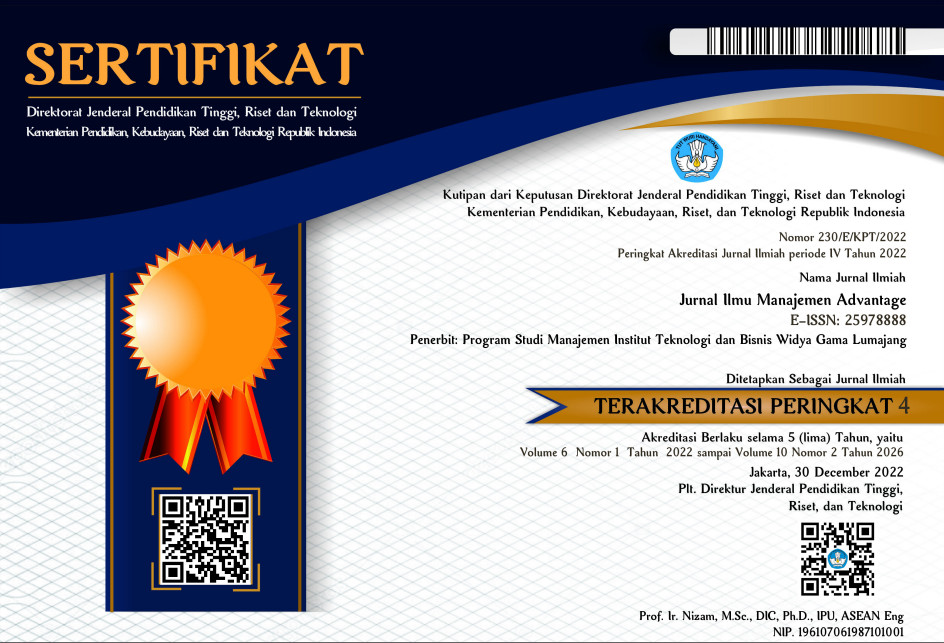Compensation, Training and Development of Turnover Intention for Creative MSME Employees in Bandung City
DOI:
https://doi.org/10.30741/adv.v6i2.921Keywords:
Compensation, Development, Practice of Human Resources Management, Turnover IntentionAbstract
Every MSME always expects their employees to have good working performance because having such qualified employees may provide optimal contributions for the organization. Besides, by having employees with good working performance, MSMEs can improve their business performance. The purpose of this research is to identify the influence of compensation, training, and development on the employee turnover intention. Using simple random sampling, questionnaires are distributed to employees of creative industries of MSMEs in Bandung. The method used for data analysis is descriptive-verificative method with multiple regression model. The data processing is conducted by using the SPSS software version 27 for windows. The results of the research indicate that compensation has significant influence on the employee turnover intention, and so do the training and development. The two variables are able to provide contributions to the employee turnover intention of 77,3%, while the rest is influenced by the variables which are not investigated in this research.
Downloads
References
Aburumman, O., Salleh, A., Omar, K., & Abadi, M. (2020). The impact of humanresource management practices and career satisfaction on employee’s turnover intention. Management Science Letters, 10(3), 641-652. https://doi.org/10.5267/j.msl.2019.9.015
Al-Dossary, R., Vail, J., Macfarlane F. (2012). Job Satisfaction Of Nurses In A Saudi Arabian University Teaching Hospital : A Cross-Sectional Study. International Nursing Review, 59(3), 424-30. https://doi.org/10.1111/j.1466-7657.2012.00978.x
Ali, N., Kakakhel, S. J., Rahman, W., & Ahsan, A. (2014). Impact of HRM Practices on Employee' Outcomes. Life Science Journal, 11(4), 68-77.
Almalki, M., Fitzgerald, G., & Clark, M. (2012). Quality of work life among primary health care nurses in the Jazan region, Saudi Arabia: a cross-sectional study. Human Resources for Health, 10(10), 30-42. https://doi.org/10.1186/1478-4491-10-30
Ardiansyah, A. Hamidah, H., & Susita, D. (2020). The Influence of Organizational Culture and Compensation toward Organizational Citizenship Behavior and Its Implications on Turnover Intention of the Internal Employees of Matahari Department Store. International Conference on Humanities, Education, and Social Sciences, KnE Social Sciences, 21-36. https://doi.org/10.18502/kss.v4i14.7855
Budiarti, I. (2013). Analisis Kompetensi Pengaruhnya Terhadap Kinerja Karyawan Pada Pt. Pos Indonesia (Persero) Bandung. Jurnal Ilmu Politik dan Komunikasi (JIPSI), 1(1), 1-8.
Cesário, F. & Magalhães, S., (2016), Human Resources Management, Citizenship Behavior, and Turnover Intention in the Portuguese Public Administration. International Journal of Public Administration, 40(11), 979-988. https://doi.org/10.1080/01900692.2016.1242609
Dasilveira, I. K., Yang, J., Mensah, I. A., & Quarcoo, A. (2020). Human Resource Management Practices and Employee Turnover Intentions Nexus: Does the Mediating Role of Job Satisfaction Matter? Open Journal of Business and Management, 8(1), 1-29. https://doi.org/10.4236/ojbm.2020.81001
Firmandari, N. (2014). Pengaruh Kompensasi Terhadap Kinerja Karyawan dengan Motivasi Kerja Sebagai Variabel Moderasi (Studi Pada Bank Syariah Mandiri Kantor Cabang Yogyakarta). EKBISI, 9(1), 25-34.
Hair J. F., black, W. C., Babin, B. J., & Anderson, R. E. (2010). Multivariate Data Analysis. Seventh Edition. Pearson Prentice Hall.
Hasibuan, M. S. P. (2016). Manajemen Sumber Daya Manusia. Edisi Revisi. Bumi Aksara.
Hom, P. W., Mitchell, T. R., Lee, T. W., & Griffeth, R. W. (2012). Reviewing employee turnover: Focusing on proximal withdrawal states and an expanded criterion. Psychological Bulletin, 138(5), 831–858. https://doi.org/10.1037/a0027983
Iqbal, F., Nawaz, K., Younas, W., & Nadeem, M. T. (2019). Evaluating the Effect of Leadership Behavior and Organizational Contextual Performance on Employee Turnover Intentions. International Journal of Recent Innovations in Academic Research, 3(6), 35-47.
Jahya, A., Azlin, S. N. I., Othman, R., & Romaiha, N. R. (2020). Turnover Intention among GenY: The Role of Training and Development, Compensation and Organizational Culture. International Journal of Academic Research in Business and Social Sciences, 10(10), 765-78. http://dx.doi.org/10.6007/IJARBSS/v10-i10/7975
Khan, H. (2016). Job Satisfaction and Intention to Leave the Current Job among Expatriate Teachers in Three Private Schools of Dubai. Masters of Education in Management Leadership and Policy, The British University in Dubai.
Mangkunegara, A. P. (2008). Manajemen Sumber Daya manusia Perusahaan. PT Remaja Rosdakarya Bandung
Manthi, K. A., Kilika, J. M., & Kimencu, L. (2018). How Do Human Resource Management Practices Predict Employee Turnover Intentions: An Empirical Survey of Teacher Training Colleges in Kenya. International Journal of Business Administration, 9(4), 201-213. https://doi.org/10.5430/ijba.v9n4p201
Mathis, R. L., Angelica, P. D., & Jackson, J. H. (2011). Human Resource Management (10 ed.). Salemba Empat.
Mehmood, Y., Sambasivam, P., Kaur, S., Davidson, J., Leo, A. E., Hobson, K., . . . Ford, R. (2017). Evidence and Consequence of a Highly Adapted Clonal Haplotype within the Australian Ascochyta rabiei Population. Front Plant Sci, 8, 1029. https://doi.org/10.3389/fpls.2017.01029
Mobley. (2011). Pergantian Karyawan: Sebab, Akibat dan Pengendaliannya. PT Pustaka Binaman Pressindo.
Mulyadi. (2016). Sistem Informasi Akuntansi. Salemba Empat.
Oktavian, R. F., Satriawan, B., & Johan, A. (2022). Pengaruh kepemimpinan transformasional dan kepemimpinan diri terhadap kinerja adaptif selama krisis: Peran mediasi pemberdayaan psikologi. Fair Value: Jurnal Ilmiah Akuntansi dan Keuangan, 4(8), 3402-3412. https://doi.org/10.32670/fairvalue.v4i8.1396
Paramita, R. W. D., Rizal, N., & Sulistyan, R. B. (2021). Metode Penelitian Kuantitatif Edisi 3. Widya Gama Press.
Santhanam, N., Kamalanabhan, T. J., Dyaram, L., & Ziegler, N. (2016). Impact of human resource management practices on employee turnover intentions:moderating role of psychological contract breach. Journal of Indian Business Research, 9(3), 212-228. https://doi.org/10.1108/JIBR-10-2016-0116
Sekaran, U. & Bougie, R., (2016). Research Methods for Business : A Skill Building. Approach Seventh Edition. Wiley.
Simon, M., Müller, B. H., & Hasselhorn, H. M. (2010). Leaving the organization or the profession - a multilevel analysis of nurses' intentions. Journal of advanced nursing, 66(3), 616–626. https://doi.org/10.1111/j.1365-2648.2009.05204.x.
Sugiyono. (2018). Metode Penelitian Kombinasi (Mixed Methods). CV Alfabeta.
Whiteoak, J. W. (2007). The Relationship among Group Process Perceptions, Goal Commitment and Turnover Intention in Small Committee Groups. Journal of Business and Psychology, 22(1), 11–20. http://www.jstor.org/stable/25092984
Yang, J. T., Wan, C. S., & Fu, Y. J. (2012). Qualitative examination of employee turnover and retention strategies in international tourist hotels in Taiwan. International Journal of Hospitality Management, 31(3), 837-848.
Zhang, Y., & Feng, X. (2011). The Relationship Between Job Satisfaction, Burnout, and Turnover Intention Among Physicians from Urban State Owned Medical Institutions in Hubei, China: A Cross-Sectional Study. BMC Health Services Research, 11, 235-245. https://doi.org/10.1186/1472-6963-11-235
Downloads
Published
How to Cite
Issue
Section
License
Copyright (c) 2023 Razka Gisnatiansyah, Ivan Gumilar Sambas Putra

This work is licensed under a Creative Commons Attribution-NonCommercial 4.0 International License.










